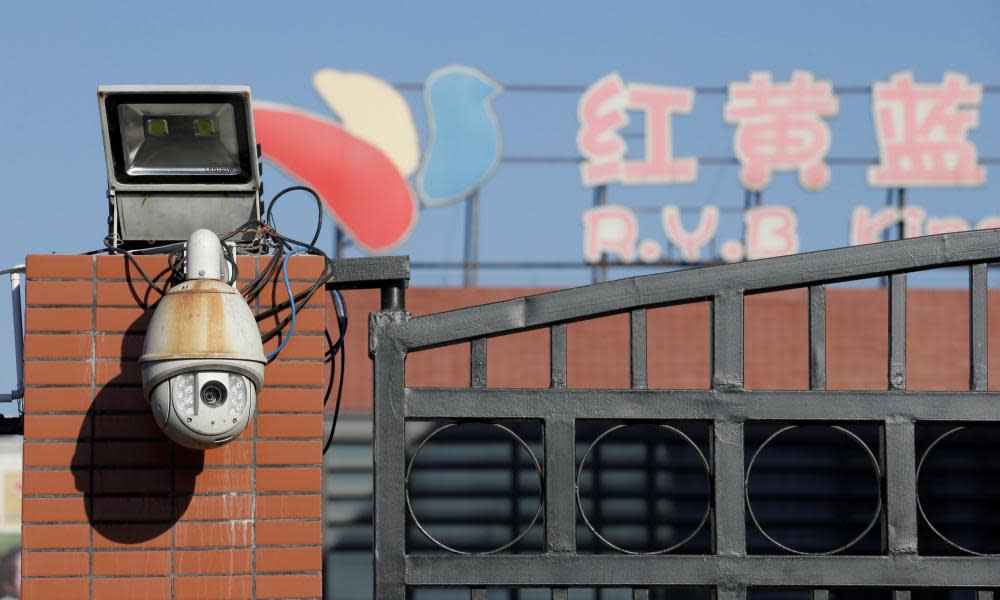China horrified by allegations of child abuse at kindergarten

Chinese authorities are promising swift and decisive action after horrific allegations of child abuse surfaced at an upmarket nursery just a few miles east of the Communist party’s leadership compound in Beijing.
Since Wednesday, Chinese media outlets have reported claims from outraged parents that toddlers at the nursery in Beijing’s Chaoyang district were molested, spiked with needles and drugged with mysterious white pills.
“For two days my daughter has been crying: ‘I’m not sick, so why give me shots?’” one mother told China Women’s News, a party-run newspaper.
Another parent claimed children had been told to take two white tablets each day after lunch, for reasons that are unclear.
“Disobedient students were also forced to stand naked or were locked up in a dark room at the kindergarten,” a third parent told the magazine Caixin.
“I am trembling with anger now,” a fourth parent was quoted as saying by the Beijing News on Thursday as relatives gathered outside the nursery to demand access to CCTV footage that might confirm the abuse.
The nursery is run by RYB Education, a company that is listed on the New York stock exchange and describes itself as China’s largest early childhood education service provider, with more than 4,400 staff.
In its Nasdaq profile, RYB says it was “founded on the core values of ‘care’ and ‘responsibility’”. It operates more than 1,100 nurseries and pre-school centres in 307 Chinese cities for children up to the age of six.
Reports detailing allegations of China’s third recent child abuse scandal triggered an outpouring of online rage. Earlier this month, a Shanghai nursery found itself at the eye of a similar storm after claims children in its care had been beaten and force-fed wasabi.
On Weibo, China’s Twitter, one story about the alleged abuse attracted more than 7,000 comments.
One reader, using the alias Guodong, lashed out at the “devil teachers” allegedly responsible: “This nursery seems like some kind of hell.”
“The government must give us an explanation! Who on earth allowed this nursery to become a devil’s nest?”
Patrick Poon, a Hong Kong-based campaigner for Amnesty, tweeted: “Terrible. Independent investigation needed.”
Strikingly, after two days of high-profile coverage in China’s party-controlled press there was virtually no mention of the scandal in Beijing’s main newspapers on Friday morning. That suggested propaganda officials – nervous about the potential for a political backlash from China’s middle-classes – had ordered newsrooms to dial back their reporting.
In an online statement, RYB said it was “deeply sorry” for the situation and awaiting the conclusion of the government’s investigations.
It said: “We are cooperating with the police by providing relevant surveillance material and equipment. The teachers involved have been suspended and we are cooperating with police.”
Education authorities vowed that any staff found to have “caused physical or psychological harm” to children would be severely punished.
Dozens of curious locals, and some men who appeared to be plainclothes security agents, gathered outside the nursery on Friday afternoon beneath a billboard bearing a photograph of two smiling girls and the slogan: “Make children happy and competitive”.
One mother who emerged from the building said she believed the allegations were now being “actively investigated” but was keeping her child at home. “They will not hide anything,” said the woman, who declined to give her name.
A second mother was less certain. “I’m quite worried the whole thing will be hushed-up,” she said. “Lots of people believe we can no longer remain silent ... This kind of thing has happened over and over again in China.”
Additional reporting by Wang Zhen

 Yahoo News
Yahoo News 
